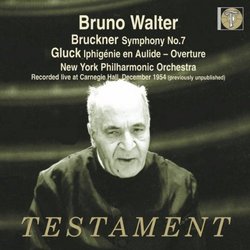| All Artists: Anton Bruckner, Christoph Willibald Gluck, Recorded Sound, Bruno Walter, New York Philharmonic Title: Bruckner: Symphony No. 7; Gluck: Iphigénie en Aulide Overture Members Wishing: 0 Total Copies: 0 Label: Testament UK Original Release Date: 1/1/2008 Re-Release Date: 10/14/2008 Album Type: Import Genres: Special Interest, Classical Styles: Opera & Classical Vocal, Historical Periods, Classical (c.1770-1830), Modern, 20th, & 21st Century, Symphonies Number of Discs: 1 SwapaCD Credits: 1 UPCs: 749677142421, 0749677142421 |
Search - Anton Bruckner, Christoph Willibald Gluck, Recorded Sound :: Bruckner: Symphony No. 7; Gluck: Iphigénie en Aulide Overture
 | Anton Bruckner, Christoph Willibald Gluck, Recorded Sound Bruckner: Symphony No. 7; Gluck: Iphigénie en Aulide Overture Genres: Special Interest, Classical
|
Larger Image |
CD Details |
CD ReviewsA great Bruckner 7th that sheds new light on Walter's style Santa Fe Listener | Santa Fe, NM USA | 01/26/2009 (5 out of 5 stars) "Although Bruno Walter has been one of the presiding saints in the history of Bruckner performance, his very late (1961) account of the Bruckner Seventh has aroused some disappointment. Critics found Walter wanting in energy, and the Columbia Sym. was too skimpy in the string section to capture the sweling sonority of Bruckner's orchestration. Happily, this concert recording from Dec. 1954 in Carnegie Hall addresses both complaints.
Here, the NY Phil. is at full strength, and so is Walter. At age 78 he was a vigorous conductor with a fiery style and a thrusting sense of pace. There is some raggedness in ensemble, a scattering of coughs from the audience, and brash brass attacks. Those are minor defects in a reading this sweeping and sympathetic to Bruckner's cause. The excellent mono sound derivesa from an official recording done by engineers from Columbia Records but never commercially released. Normally, mono diminishes Bruckner's huge soundscape, but in this instance a minimum is lost -- one can listen quite comfortably. In terms of natural expression and innate feeling for Bruckner's idiom, it would be hard to find a reading to equal this one -- by comparison, almost every rival seems stiff-necked. It's interesting to compare timings with Walter's stereo remake, done four years after the massive heart attack that pushed him into final retirement in Los Angeles. Mvt. 1 -- 17:25 (1954) 20:46 (1961) Mvt. 2 -- 16:59 (1954) 19:25 (1961) Mvt. 3 -- 8:58 (1954) 10:21 (1961) Mvt. 4 -- 12:16 (1954) 13:53 (1961) These timings indicate how much Walter slowed down in later years, although they can't begin to suggest how successful both accounts are, each in its own way. The Adagio in 1954 feels propulsive, even impatient, while in 1961 it is sweetly singing and reflective. There's no need to label one good and the other bad. The main thing is that if we had only the later recording, we'd take a skewed view of Walter's approach to Bruckner. The Scherzo in particular is almost breathlessly fast. For the time, he was definitely at odds with other Brucknerians like Knappertsbusch, Celibidache, and Klemperer, who favored broad, architectonic spaciousness. (Admittedly, Klemperer was another one whose early tendency towards fiery speed turned into its opposite in old age.) In sum, this is the best addition to the Walter discography that I've run across in several years and a revelatory performance. P.S. -- One irritation, however, is Testament's failure to provide even a second's silence between tracks. With the filler of the Gluck overture to Iphigene en Aulie, part of the same concert, this disc still times out at just over 67 min. -- breaks between movements were quite feasible." |

 Track Listings (5) - Disc #1
Track Listings (5) - Disc #1